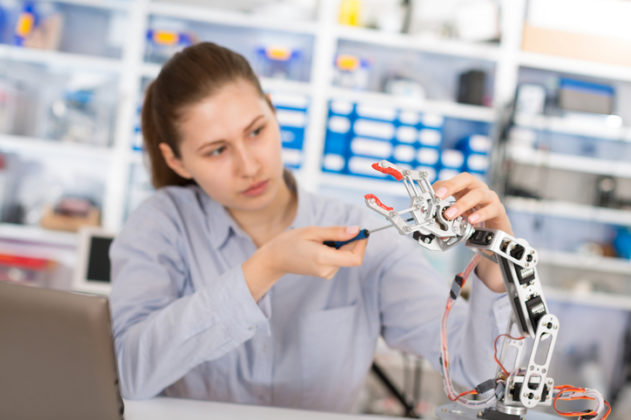The root of the problem is systemic patriarchy that wants women out of the lab and back home taking care of babies.
Hillary Clinton, when recently interviewed at the Women’s World Summit, acknowledged that misogyny contributed to her defeat. Although many Americans are quick to rebuke this claim, women in science and engineering careers can strongly identify with her position; we too have experienced, and continue to experience, the stinging consequences of an oppressive patriarchy that still cannot adapt its worldview to include successful, powerful women.
A classification scheme exists that labels women either nurturing mothers or malicious shrews; the patriarchy defaults to the former. Women are supposed to look after, care for, and encourage. This manifests in the academy through the traditionally supportive roles women often fill. We are supposed to type manuscripts and prepare book indexes, à la the Pymian “excellent woman,” and if we push the boundary of that supportive role, or, heaven forbid, overstep it altogether, we’re re-categorized as a shrew.
As a female scientist, I have had my fair share of misogynistic experiences. Some of them were covert attempts to remind me of my pre-determined role, while others were more flagrant. My male post-doctoral mentor repeatedly requested and expected me to babysit his child, even during a business trip where I was supposed to network with senior colleagues (My 6’5″ male counterpart was never solicited for such duties). This same mentor got hostile when I questioned why he was forcing me to add co-authors, including his wife, to an academic paper when they did not contribute to the research in any capacity. Yet, when I spoke to the male executive director about such ethical concerns, the only real recourse I had at the time, he told me that as a post-doctoral researcher, I was “two steps above a slave” and I should “just be happy to have a first-authored article.”
The message was clear: I was overstepping my boundaries, I should be grateful for any opportunities provided to me, and I should stop being a troublemaker. I was extremely fortunate to leave that position after a year, but many women are trapped. There are so few academic employment openings in any given year, and competition is high and qualifications are usually very specific. I often question how long I would have lasted in science if I had to remain in that stifling environment, and I recognize misogyny is a fundamental source of the gender gap in STEM.
The gender gap statistics are staggering. Although college-educated women make up approximately half of the U.S. workforce, they account for only 29% of science, technology, engineering, and math (STEM) jobs. Disparities continue when the STEM occupations are examined by field, with only 25% and 15% of women occupying computer science and engineering careers, respectively. Social science is the only field where women outnumber the men, with the majority employed as psychologists. What a shocker: More women than men are earning a living through listening, supporting, and encouraging.
There are, without doubt, detrimental career ramifications to women in STEM as a result of misogyny. Our scientific contributions are ignored, our salaries are lower, and we are seen as not as competent as our male counterparts; however, there are even more serious consequences of this cultural framework—sexual harassment and assault. In a study published in 2014, it was found that 64% of academic respondents, mostly women, had experienced sexual harassment, and over 20% had experienced sexual assault. The majority of these academics were early in their careers, including students and post-doctoral researchers, with the perpetrators being senior to them. Moreover, women were more likely to experience sexual harassment and sexual assault than their male counterparts.
Enough is enough. Something has to change.
There will be those who claim that the gender gap in STEM has more contributing factors than just misogyny. There’s no denying that, and trying to attain a work/life balance is an important variable in the equation. However, I have yet to find a panel or symposium addressing the problem of male academics struggling to balance family with their career. The root of the problem is systemic patriarchy that wants women out of the lab and back home taking care of babies.
There are no easy solutions, and it will take steadfast commitment from women and men for things to change. In a perfect world, parents will realize the value of teaching gender equality to both their daughters and sons to make way for the necessary paradigm shift. Until that happens, codes of conduct need to be made mandatory in every academic sphere, especially those in STEM, so that when misogyny rears its ugly head, those it affects will have a clear path toward resolution. And, until we tackle those systemic inequalities, no amount of “empowerment” will keep women in STEM at all.
Kristin L. Krueger, Ph.D. is an Assistant Professor of Anthropology at Loyola University Chicago and is a Public Voices fellow.
Other Links:

